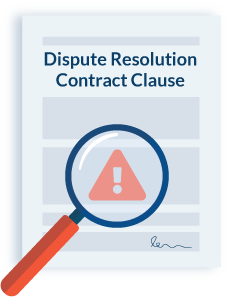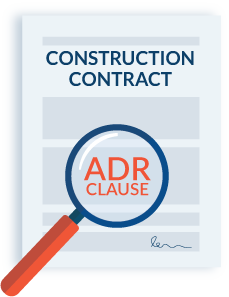

Take a deep dive into dispute resolution contract clauses, and learn how they set the stage for Alternative Dispute Resolution (ADR) when a problem occurs on a construction project.
No construction project runs exactly according to plan. That’s why it’s important to review every aspect of your construction agreement. A well-drafted contract will anticipate any and all possible outcomes, and most importantly, how disputes will be handled. And a big part of that will be the dispute resolution clause contained within your contract.
How does an alternative dispute resolution clause work?
Construction contracts will often include an Alternative Dispute Resolution (ADR) clause (also called simply a “dispute resolution clause”) that will set out how certain disputes must be handled.
Often, these clauses will mandate a specific type of alternative dispute resolution or defer to some in-house process before legal claims may be made.
Since any dispute clause is a part of the construction contract, the parties must agree prior to work that an ADR of some specific method will govern any disputes that arise on the project. The clause generally requires the parties to waive their right to litigate a construction dispute in court.

Many of the standardized dispute resolution clauses are widely-used in standard construction contract documents throughout the industry (see links to common ADR clauses below).
Thus, it is usually pretty easy for a company to know what they are getting into by accepting an ADR clause. Further, as compared to traditional litigation, there are numerous benefits to ADR for construction disputes.
Finally, though, with any type of construction dispute resolution – whether ADR or litigation – the parties must pay careful attention to how mechanics lien rights may be affected.
Common Alternative Dispute Resolution methods in construction
Even the “more efficient” dispute resolution processes can lead to delays, extra costs, negative feelings, etc. Hopefully, a dispute doesn’t get this far. But hope isn’t a strategy. A well-crafted dispute resolution clause will not only provide for the ability to avoid the escalation of a dispute, but it will also plan for a situation where escalation is unavoidable. A dispute resolution clause may require you to use one of these Alternative Dispute Resolution (ADR) methods.
Construction Mediation
In mediation, an unbiased third party attempts to bring the two parties to a mutual agreement. Mediators are not negotiators, nor do they represent any individual party. Rather, the mediator acts as a facilitator between the parties’ opposing interests.
During this procedure, the mediator will meet with each party privately to assess the merits of their claims, and assist in structuring settlement offers. They will not render any opinions regarding liability or damages, but will attempt to get concessions from each party to come to a reasonable agreement.
Further reading: Should you file a mechanics lien before mediation?
Mediation proceedings are both private and confidential, meaning that any statements or admissions made during the proceedings cannot be later used in any other arbitral or judicial proceedings.
Keep in mind that the resolution proposed by the mediator is non-binding. If a party doesn’t agree to the terms set forth in the mediation proceedings, they may still file a lawsuit afterward.
Construction Arbitration
Compared to other alternative dispute resolution methods, binding arbitration is formal, expensive, and carries a lot of risks. In that sense, it’s like the “lite” version of a lawsuit.
In arbitration, a third party arbitrator acts as a private judge. At the end of the day, their decision is final. The arbitration is usually administered by a private organization whose the arbitrators are attorneys or retired judges.
The arbitrators provide rules under which the arbitration will be conducted. Unlike mediation, the decision is typically final and binding. What’s more, they’re only subject to limited court review – so if one side feels like they got the short end of the stick, they might not be able to appeal the decision in court.
The process of arbitration is more involved than negotiation or mediation, as it includes an arbitrator performing the following:
- Reads briefs
- Hears testimony
- Examines evidence
- Renders an award on liability & damages
Dispute Resolution Board (DRB)
A Dispute Resolution Board (DRB) is a little more innovative, and it’s not yet widely used in the construction industry. That being said, a dispute resolution board may be the fairest way to resolve disputes on construction projects.
Before getting too far, though, note that using a dispute resolution board can be an entailed process, so DRBs make the most sense on massive, complex projects where the extra effort and cost will be worthwhile.
Anyway, dispute resolution boards are pretty well-named. It’s a board (anywhere from 1-3 people) which is appointed to resolve disputes on a given construction project. Members of a dispute resolution board are experts in the industry, and they’re kept well-acquainted with the projects on which their services might be needed.
Benefits of an ADR clause
A dispute resolution clause seeks to take the uncertainty out of any dispute. This should save time, and saving time means saving money. Here are some specific benefits of a dispute resolution clause:
Standardized Clauses
If a construction contract contains an Alternative Dispute Resolution (ADR) clause, there’s a pretty good chance the language originally came from one of these three locations:
- American Institute of Architects (AIA) contract documents
- ConsensusDocs
- American Arbitration Association (AAA) recommended provisions
While the language can potentially be modified, a large potential benefit of these provisions is that they have been standardized and have reliable interpretations.
In other words, as long as the provision has not been modified, the parties know what they’re getting into and can easily understand the provision and its impact.
ADR provides privacy
If you file suit in court, that litigation is out there for all the world to see. Mediation and arbitration proceedings remain private.
The public nature of a lawsuit can sometimes be a helpful lever to inducing a settlement of the dispute. But there are certain circumstances in which the parties would desire privacy to the resolution of disputes related to the project.
ADR methods can be faster
Mediation and arbitration are generally much faster than litigating an issue in court. One big reason for this is the ability of the neutral party to avoid or smooth out procedural hiccups that could bog down litigation.
Additionally, neutrals in an arbitration or mediation are generally able to give more “personalized” attention to each dispute, which can lead to a faster outcome.
Subject matter experts
In many cases, the neutral party to the arbitration or mediation can be a subject matter expert, or someone who has dealt with the particular disputes at issue many times before.
In a court of law, the judge you end up before is a crapshoot, and the jury (if the case is tried before a jury) are likely not going to be experts in construction or any of the potential issues surrounding construction. The ability to have the resolution of the issue guided by a party that actually knows what they are talking about can be huge.
Read more: A Guide to Common Construction Claims & How to Manage Risk
Alternative Dispute Resolution vs. Mechanics Lien Rights
What happens to your mechanics lien rights when you sign a construction contract that contains an ADR clause? Well, the answer may be hard to determine.
To explain, consider the following scenario:
On a large commercial construction project, an HVAC subcontractor is having trouble getting paid. At the start of the project, the sub signed a contract with an ADR clause mandating that any disputes must be settled through arbitration.
Eventually, the sub files a mechanics lien in an attempt to get paid the money owed to them. However, the general contractor believes that the sub’s lien claim is invalid and wants to challenge it. So, who decides if the lien is valid — the arbitrator or the court?
Courts are conflicted about this issue nationwide, and sometimes even within single states. Mechanics lien rules are governed under their own statutes, often separate from contract laws. It’s a really wonky issue.
Furthermore, while it may make practical sense to withhold a lien claim filing until after mediation fails, the reality is that lien and bond claim deadlines are short and are not extended by mediation proceedings or the agreement of the parties. Accordingly, if you don’t file your claim before mediation, it’s likely that you won’t have it after mediation.
Fortunately, most courts have concluded that mechanics liens and bond claims can be filed when the money is owed, regardless of any agreement to resolve the dispute through mediation or arbitration.
The bottom line? If you’re ever forced to file a mechanics lien, be sure that your mechanics lien is valid.
